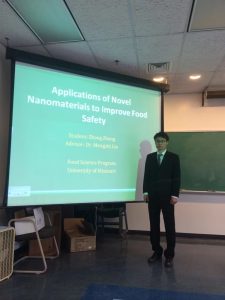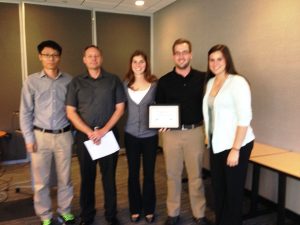Jason Zhang grew up with an entrepreneurial spirit – as well as an interest in food science. He now pursues both passions as cofounder of Layer Origin Nutrition, a group focused on human gut health, specifically forward-thinking prebiotics.
Zhang’s path to running his own business comprised of a handful of stops, including a few years at the University of Missouri, where he earned his PhD in food science.

“I always had a desire to be an entrepreneur,” Zhang said. “I’m really thankful for how each of my professional stops helped prepare me for this time of life as an entrepreneur. It’s been a roller coaster, but I’ve made many great connections and learned a lot.”
Zhang’s food science journey began in China at Jiangnan University, one of the top food science universities in the country. His first trip to the United States came after earning his undergraduate degree, when he was accepted as a graduate student at MU.
Zhang, who grew up in southern China, and his wife, Sha, first stepped onto the Columbia campus in 2011 as they both began the pursuit of their PhDs in food science.
“We were very fortunate that the food science program at MU was willing to accept both of us at the same time,” Zhang said. “We had each received multiple offers but this opportunity worked out perfectly for us. We were obviously hoping that we could stay together.”
Zhang studied under Mengshi Lin and Azlin Mustapha, both professors in the Division of Food, Nutrition and Exercise Sciences. His research focused on building stronger substrates to detect food contaminants using nanotechnology.
“Our goal was to develop better performing substrates for Raman spectroscopy,” Zhang said. “We used particles called gold nanorods, which are very, very small. We developed the methods to arrange nanorods into arrays, like soldiers standing up. Those standing nanorod arrays create very strong and stable electromagnetic field to enhance the signals of Raman spectroscopy for millions of times. This made the detection of trace amount of food pesticides very easy. We published a couple papers during my time at MU, and I’m really proud of that work.”
Along with his research experience, Zhang was also part of the dairy product judging team, where he participated in multiple collegiate competitions, including at the national level, and won awards in a few product categories.
“I really enjoyed my time at Mizzou,” Zhang said. “The food science faculty were great to work with and staff were so friendly. While it is a small program, it’s definitely a strong one. I also appreciated how well they treated international students, as this was my first international academic experience.
“The time I spent in Columbia was very rewarding. It’s an experience that I’ll never forget.”
After earning his PhD from Mizzou in 2014, he soon landed a faculty position with the University of Nebraska-Lincoln.
“Being a professor was definitely a goal I had, too,” Zhang said. “I had my own laboratory and PhD students who were working with me. The university gave me great support. I was doing a lot of research on developing healthy food ingredients, which was exciting. But in the back of my mind, I still wanted to do my own thing.”

Zhang eventually landed at Cornell University for a postdoctoral fellowship, where he came across human milk oligosaccharide (HMO). Zhang said that he was amazed by the benefits of HMO to the human gut microbiome and decided to co-found Layer Origin Nutrition to develop the best line of HMO prebiotic to improve people’s gut health and gut microbiome.
Their HMO does not contain any human milk. Instead, it’s produced via an enzymatic fermentation process and results in a powder that is bio-identical to the HMO in real human milk. Zhang said it comes with the same benefits of milk-based HMO.
“I became fascinated by the amazing health benefits of this unique fiber,” Zhang said. “Human milk is the only prebiotic that infants take to nourish the bacteria in their stomach. I was interested in seeing if we could apply that technology to an adult’s microbiome, without using human milk.”
Because he is part of a start-up, Zhang said he wears many hats. He is actively involved in research and development, as well as coordinating with the marketing team for product launches. He also collects current publications related to microbiomes.
“There is a lot of research being published related to this topic,” Zhang said. “The bacteria in your gut is incredibly important to your health, your mood, your sleep patterns and your brain functions. I do a lot of skimming through publications so that I can translate the science into easier to understand language for our customers.”
Zhang added that the company is continuing to grow its customer base and has passed the seven-figure revenue mark since the launching of its HMO product line two years ago. He said they are always looking for partners and investors to help scale the company to the next level, too.
“Being an entrepreneur can be a stressful experience, but it has also been very rewarding,” Zhang said. “And I would say that there’s no right or wrong way to go about it. The most important thing is to follow your passion and bring value to your customers. We made many early-stage mistakes, but our team learned from those mistakes and I am really excited about what we’re doing at Layer Origin.
“At the end of the day, it’s important to just follow your dreams and your ideas. I enjoy being able to share what I’ve learned throughout the process with others, and I am proud of being a Mizzou alum.”